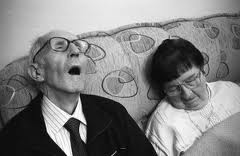 Life has a natural progression that takes each one of us from being young to realizing the beauty of getting older. Some of the comparisons created when we look back on from our college years as we age are hilarious, but also a wake up call.
Life has a natural progression that takes each one of us from being young to realizing the beauty of getting older. Some of the comparisons created when we look back on from our college years as we age are hilarious, but also a wake up call.
For example, let’s consider the following comparisons:
Food
College: No problem eating a whole pizza by yourself and staying a petite size 2
vs
Now: Eat a slice of pizza and gain a bulging belly the next day with an extra pound that never leaves.
Sleep
College: No problem going out late partying and them bouncing back the next day to take a school exam, then heading out for another party that night.
vs
Now: Home in bed by 10 and still tired the next day
Alcohol
College: No problem drinking 6 pack with no hang over the next day
vs
Now: I had 2 glasses of wine last night and I have a headache
How life changes. Enough reminiscing – let’s take a closer look at just one area – sleep. As seniors (or even anyone remotely approaching retirement age), we analyze everything because there is usually more to it than just the beer from last night. There are several sleep disorders that we need to consider that may cause sleep deprivation. We have to also look at what sleep deprivation may cause the body to not act in ways that we want it to or reduce the body’s ability to fight disease.
Lack of sleep studies
Studies have shown that a lack of sleep does not produce enough RNA or Ribonucleic acid, which is taken from the blood stream. The main RNA is a messenger RNA that plays a vital role in producing proteins. Professor Derk-Jan Dijik a professor and Director of Surrey Sleep Research Center and colleagues conducted a study that showed that when there is a sleep deprivation for seven (7) days straight, it would resulted in changes of 711 RNA genes. These genes are directly linked to inflammation, the ability to fight disease and reduce stress. The known damage effect on health impacts obesity, diabetes, heart disease and brain functions.
Types of sleep disorders
Some of the causes that Seniors will want to look into to properly diagnosis what may cause their deprivation:
- Central Sleep Apnea (CSA) Brain fails to tell lungs to breath. Thus, causing a lack of oxygen that the body needs. This is common amongst seniors that have heart disease or shallow breathing due to a stroke.
- Narcolepsy (aka Excessive daytime sleepiness (EDS)) often falling asleep spontaneously
- Upper airway resistance syndrome, which is difficult to diagnosis due and not recognized amongst medical society. Symptoms include daytime excessive fatigue.
- Periodic limb movement disorder(PLMD) sudden involuntary movement of legs and arms.
- Cataplexy: sudden weakness tin motor muscles can cause you to fall to the floor
- Circadian Rhythm
- Delayed sleep phase syndrome (DSPS)
- Advanced sleep phase disorder (ASPS)
- Non-24 hour sleep way syndrome
- Restless leg syndrome (RLS)
- Hypersomnia – chronic disease those who can not obtain enough sleep for a regular day of activities
- Insomnia symptom of mood disorder
It is necessary for any and everyone to maintain healthy sleeping habits of a minimum of 6-7 hours a night. It is even more important to maintain that as we age. If you suspect your body to be experience any sleep issues, I urge to seek advise from your doctor.